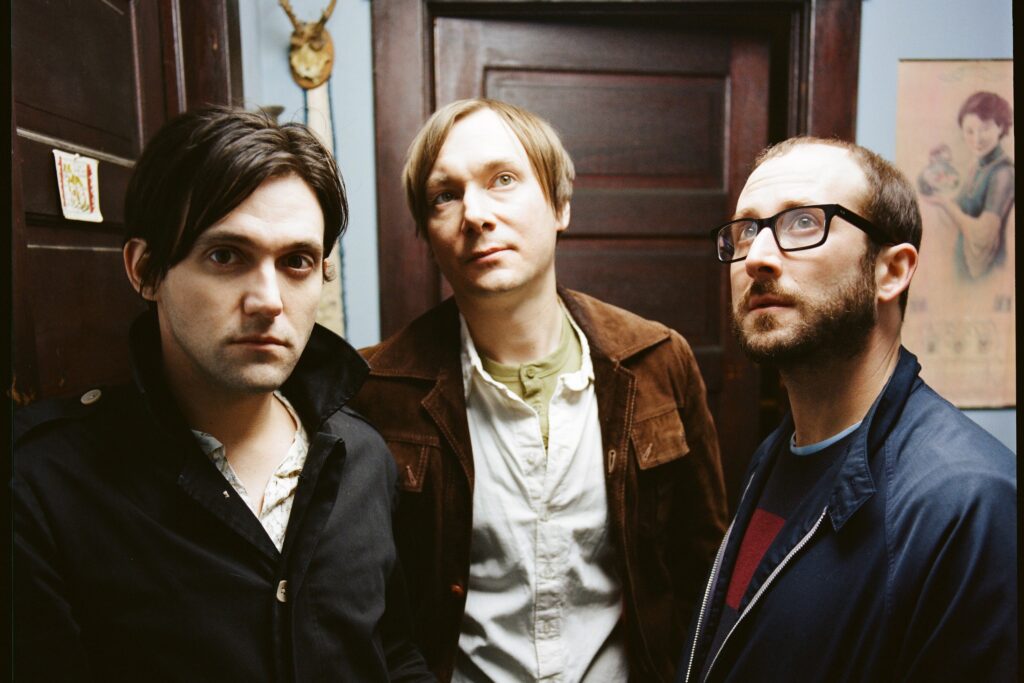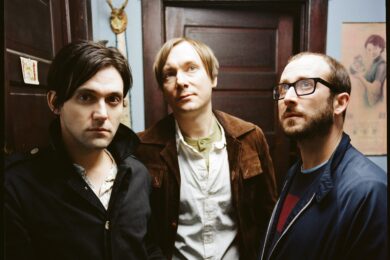In a humming Midwestern town in 1993, an old lady is in her house, praying the rosary. She feels the beads on her crucifix with her fingers to keep track of the number of prayers she has recited to the Lord. Her grandson, looking on, plays with his friends in a band and records his own demo tapes on cassette. His voice hasn’t broken yet, so he sounds pretty similar in pitch to a kid who was doing the same thing in his basement 10 years earlier called Daniel Johnston, whose voice never seemed to break, and whose basement tapes came from a soul so twisted with mental difficulties he ended up in a nuthouse. "Depression sets in again, I know how that goes," the boy empathises in the first lines of a song called ‘Lava Monster’, addressed to a friend suffering from what must be a familiar infirmity among tape-makers.
He’s 13, remember.
The boy changes the tape over and records a new song with just his guitar and his grass-thin voice. In this song he introduces another leitmotif that runs through all of his music from that day on: "Words don’t quite explain what I’m trying to say. I don’t know where to go; I guess I’ll just ask the Ouija board."
Seventeen years later, Conor Oberst’s music has found a big enough audience for him to have hundreds of people singing along to his songs of pain in faraway places like London, where he is currently playing with his most successful band, Bright Eyes, in support of their new album, The People’s Key. But like so many artists who have invested their art with investigations of faith and spirituality, he is not much closer to solving the problems that sent him running to the Ouija board aged 13; the inadequacy of language to describe where or whom he is, and that old chestnut of what the hell we’re doing in this cage of a life. "I haven’t been praying too much," he says with the sarcasm of a man who wrote a scathing protest song against George W. Bush called ‘When the President Talks to God’.
"I don’t know, prayer’s weird, because prayer and sending someone positive vibes are kind of the same thing – thinking something good instead of thinking something negative. Or meditating. I haven’t practiced meditation in any real way in my life. I think I’d be better off if I did, but I haven’t gotten round to it yet. Praying and meditation aren’t that far apart. When I watch my grandmother pray the rosary, she’s basically meditating. She’s reciting a mantra, essentially."
While Oberst’s music has always been heavily coloured by philosophy, with even his love songs referencing novelists Don Delillo and Milan Kundera, on 2007’s Cassadaga it became the main theme of the music. Real-life narratives were replaced by more cryptic images and his yell of a voice decided to do some proper, tuneful singing. Philosophical and allegorical themes expanded like foam and now they not only fill the gaps in-between, but swamp the songs on the most recent Bright Eyes records. When you consider the albums’ framing monologues too (which are specifically "not ironic", he says), it makes you wonder if the doubts about the meaning of this old life are being erased, and Oberst is being won over by the folks who love telling you about energy forces.
"Yeah, I find non-mainstream religions very interesting," he says, causing laughter from his bandmates Mike Mogis and Nate Walcott. "I’m not saying I believe them. But I still find them interesting. I think there is mystery in the world. I definitely think there is no way to understand where we are, period. So it’s all going to be a guessing game. I’m not someone who says science doesn’t matter, but I also think there are so many things in scientific history that we’ve obviously refuted, that were once indisputable facts."
In his songs, medicine is a futile concept. In ‘Scale’ from Fevers and Mirrors, he screams of a disease which doctors can’t treat. On ‘Bowl Of Oranges’ from Lifted…, the doctor is a character who is himself ill, but is cured by someone sitting and holding his hand — by the warmth of love, perhaps. It’s in the consciousness, then (which dualists such as the authors of Genesis and philosopher René Descartes maintain operates beyond the physical realm) where the action really happens. He says it on ‘Jejune Stars’ from The People’s Key: "Come fire, come water, come karma, we’re all in transition. The Wheel of Becoming erases the physical mind."
"On the one hand, it’s a possibility," he says. "On the other hand, maybe it’s a bit of wishful thinking." Over nine studio albums worth of wishful thinking, in fact, where the fear of death has expanded and ideas about the nature of existence have been dragged from his grandmother’s Christianity, mysticism and a whole lot of other reading material. In ‘Arc of Time’, belief in Jesus is the gateway to eternity. In ‘I Believe in Symmetry’, the world is just too perfect for there not to have been a creator. "I think all of my songs have been an expression of the moment I’m living in," he says. "There’s a basic desire for clarity from myself. That’s a big reason to write for me. I feel like most of my thoughts are very jumbled and I kind of go back and forth on a lot of notions."
Bright Eyes the band is an ever-changing storm blowing out of the Midwest every couple of years, settling briefly in cities at night. Last time around, it came dressed in white suits with country violins and Bob Dylan’s Desire stirring its breath. This time it comes with two drummers, synth, organs and Nate Walcott’s elegiac horn sounds fluttering at half-mast. On The People’s Key, Oberst uses the image "tree of smoke", which is a direct reference to one of his favourite authors, Denis Johnson. Like the Oberst of ten years ago, Johnson started out writing tales of illuminated realism, with bruised angels clinging onto their lives and sanity in a cruel world. They were junkies and losers with the hand of God on their shoulder. It’s easy to see what Oberst likes about Johnson’s books and Jesus’ Son in particular.
But like Denis Johnson, Bright Eyes have matured to take on the ideas they used to consume piecemeal – the allegorical and the Godly, which was always mixed with small-town realism – and swallow them whole. On record, it can all seem rather confusing and distant. But in the live arena, the new songs resonate more strongly when placed against the more immediate cries of the older material.
Like with Dylan, who was championed by Alan Ginsberg early in his career, Bright Eyes are being put on the highest shelves of culture by its leading voices. That boy who wrote those cute songs about death and depression, aged 13, has escaped the basements and teenage bedrooms and crops up in Jonathan Franzen’s novel Freedom, of all places (which the band haven’t read, but know about their inclusion in). And the great American author can’t contain his praise for the band, calling Oberst "the real deal, a boy genius," and the music "like religion without the bullshit of religious dogma."
"I should say for the record that it’s very flattering to be…" Oberst false-starts his assessment of the band’s acclaim. "When anyone appreciates what we do in any context, whether it’s some more credible, legitimate source, or society saying what you do is valuable, or like a fifteen-year-old kid at a show saying your record changed his life. That’s just as valuable too. Basically, any time anyone can draw something from what we do, that’s obviously a big reason to share things with the world and participate in the world. I think art is communication. That’s one of its basic functions. I know when I’ve found something that I enjoy—whether it’s a book or a album or whatever—it makes me feel less alone, and that’s the greatest thing about it. And if what we do can serve that function for someone else, then I’d say we’re extremely happy."
Nate Walcott’s horn plays its final eulogy and Oberst blows kisses to the audience before the lights come up in London. The audience has seen the band play for two hours, and there are still scores of favourite songs — life changers, foot stompers and tear jerkers, often all in the same song — that haven’t been played. Like many masters of the game, Bright Eyes change their set-list every night, and Oberst sings each song differently every time; if a song was tender and affectionate tonight, tomorrow it will be a block of ice. It’s what makes the band’s coming-to-your-town so tense, since you never know what it will bring. Thankfully for other small-town wallflowers, the storm will blow in to other cities on this tour; whispering, singing and screaming the philosophies of life it has picked up on its journey from its inception in Omaha, Nebraska, when Conor Oberst was just a boy and the songs you know were just stains on a sheet.



